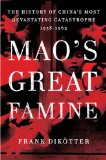
The History of China's Most Devastating Catastrophe, 1958-1962
by Frank Dikotter
"Between 1958 and 1962, China descended into hell. Mao Zedong threw his country into a frenzy with the Great Leap Forward, an attempt to catch up to and overtake Britain in less than 15 years The experiment ended in the greatest catastrophe the country had ever known, destroying tens of millions of lives."
So opens Frank Dikötter's riveting, magnificently detailed chronicle of an era in Chinese history much speculated about but never before fully documented because access to Communist Party archives has long been restricted to all but the most trusted historians.
A new archive law has opened up thousands of central and provincial documents that "fundamentally change the way one can study the Maoist era." Dikötter makes clear, as nobody has before, that far from being the program that would lift the country among the world's superpowers and prove the power of Communism, as Mao imagined, the Great Leap Forward transformed the country in the other direction. It became the site not only of "one of the most deadly mass killings of human history,"--at least 45 million people were worked, starved, or beaten to death--but also of "the greatest demolition of real estate in human history," as up to one-third of all housing was turned into rubble). The experiment was a catastrophe for the natural world as well, as the land was savaged in the maniacal pursuit of steel and other industrial accomplishments.
In a powerful meshing of exhaustive research in Chinese archives and narrative drive, Dikötter for the first time links up what happened in the corridors of power - the vicious backstabbing and bullying tactics that took place among party leaders - with the everyday experiences of ordinary people, giving voice to the dead and disenfranchised. His magisterial account recasts the history of the People's Republic of China.
"Starred Review. A direct, hard-hitting study of China’s Great Leap Forward in light of newly opened archival material… A horrifically eye-opening work of a dark period of Chinese history that desperately cries out for further examination." - Kirkus
"This is not a historical overview but an intensively researched litany of suffering, packed with statistics, grim anecdotes, and self-serving explanations by leaders responsible for the devastation." - Publishers Weekly
"Although a scholarly, heavily footnoted work, its flowing narrative - effectively a cautionary tale on the destructive powers of misguided ambition and blind hubris - reads well." - Library Journal
"The most authoritative and comprehensive study of the biggest and most lethal famine in history. A must-read." - Jung Chang, author of Mao: The Unknown Story
"Mao's Great Famine is a gripping and masterful portrait of the brutal court of Mao, based on new research but also written with great narrative verve, that tells the gripping story of the man-made famine that killed 45 million people, from the dictator and his henchmen down to the villages of rural China." - Simon Sebag Montefiore, author of Stalin: The Court of the Red Tsar
This information about Mao's Great Famine was first featured
in "The BookBrowse Review" - BookBrowse's membership magazine, and in our weekly "Publishing This Week" newsletter. Publication information is for the USA, and (unless stated otherwise) represents the first print edition. The reviews are necessarily limited to those that were available to us ahead of publication. If you are the publisher or author and feel that they do not properly reflect the range of media opinion now available, send us a message with the mainstream reviews that you would like to see added.
Any "Author Information" displayed below reflects the author's biography at the time this particular book was published.
Frank Dikötter is Chair Professor of Humanities at the University of Hong Kong and Professor of the Modern History of China at the School of Oriental and African Studies, University of London. He is a key proponent of studying the history of China in global perspective, and has published a series of innovative books, from his classic The Discourse of Race in Modern China (Univ. Stanford Press 1992) to the controversial Narcotic Culture: A History of Drugs in China (Univ. Chicago Press 2004). He lives in Hong Kong.




The low brow and the high brow
Click Here to find out who said this, as well as discovering other famous literary quotes!
Your guide toexceptional books
BookBrowse seeks out and recommends the best in contemporary fiction and nonfiction—books that not only engage and entertain but also deepen our understanding of ourselves and the world around us.